|
February 12, 2003 | 11:13 AM Bizarre Love Triangle
OK�the following article is by Liz Greene and is transcribed from this page. I didn�t include all of it because it�s very long, and it has a lot of astrological information that will make your head spin if you don�t know to what she is referring. The article is about Relationship Triangles. I have found myself in these types of relationships over and over and over again, starting with my parents (always being beteen them in some way, whether I was being fought over or used as a bargaining tool) and then once my father died, the dynamic continued with my my mother and step father and I. This continued on up though almost every relationship and friendship I have ever had: beginning with my ex boyfriend and the girlfriend he was dating when I fell for him, my ex-boyfriend and multiple other girls during our entire six year relationship, my ex-boyfriend and closest friend ever who lived with both of us for years, and now the two of them are dating (talk about bizarre love triangles-- sheesh!), my ex boyfriend, myself, and Angus. Angus myself and other girls. Amy, Alec and myself, and that whole weird situation that�s come up with numerous people recently (which I won�t go into but many of you know what I�m talking about), and on and on� I never realized how pervasive it was in my life and in the lives of just about everyone I am close to and I think this is REALLY SIGNIFIGANT. I think everyone I know (myself included) is acting out some weird archetypal/ psychological drama to work through a great deal of trauma and unresolved paradoxes left over from childhood, or if you wanna be new agey�past lives. So, without further ado, here is the article. I know I certainly benefited from it and recognized a lot of things about myself over the course of reading it, and I think many of you will as well. (yes, I know it�s long and academic which personally, I love, but if you are in my life, or happen to recognize yourself as being part of triangular relationships, I strongly advise you to read this.) ***Relationship triangles are an archetypal dimension of human life. We do not ever escape them, in one form or another. We also tend to handle them rather badly when they enter our lives. That is understandable, because triangles are usually evocative of very painful emotions, regardless of the point of the triangle on which we find ourselves. We may have to cope with feelings of jealousy, humiliation, and betrayal. Or we may have to live with the sense of being a betrayer - of being dishonest, of injuring someone. We may feel all these feelings at once, as well as the conviction of being a failure. The emotions that are involved in triangular relationships are often agonizing, and cut away at self-esteem. Because triangles confront us with very difficult emotions, we will usually find ourselves trying to blame someone for the presence of a triangle in our lives. Either we blame ourselves or we blame one of the other two people. But triangles are indeed archetypal - and if we have any question about their universality, we need only read the literature of the last three thousand years. Anything archetypal presents us with a world of purposeful patterns and intelligent inner development. There is something about the experience of the triangle which can be one of our most powerful means of transformation and growth, unpleasant and painful though it is. Betrayal, whether one is the betrayer or the betrayed, does something to us which potentially could be of enormous value. Nothing enters our lives that is not in some way connected with our individual journey. This does not imply blame or causality, but it does imply a deeper meaning which may be transformative for the individual who is prepared to seek that meaning. If a triangle enters one�s life, it is there for something. If we choose to react solely with bitterness and rage, that is our choice. But we could also choose to make the triangle a springboard for some real soul-searching. This is particularly difficult because the experience of humiliation usually invokes all the defense systems of infancy, and it is very hard to move beyond such primal responses to a more detached perspective. The universality of triangles There are many kinds of triangles, not all involving an adult sexual relationship. Even if we restrict ourselves to sexual triangles, we would find many different varieties. Sexual triangles are not always made of the grand dramatic stuff of Tristan and Isolde. In some adult love triangles, all three points are fixed. There are two partners and there is a third person involved with one of the partners, and there is no movement in the triangle. It is static and may go on for many years, until one of the three participants dies. In other love triangles, one of the points is constantly changing. One can practice serial adultery - sometimes, as in the case of John F. Kennedy, with an astonishing rate of turnover. But both these situations are triangles, even though we tend to accord a higher romantic value to the first; and both will evoke the same spectrum of archetypal emotions. Apart from triangles where a sexual involvement exists between any combination of the two sexes, there are many other kinds of triangles. The most fundamental are those involving parents and children. Triangles may also involve friendships. More complex are the triangles which involve non-human companions. One partner may feel a sense of jealousy and betrayal about the other one�s dedication to work or artistic involvement or spiritual development. Such triangles can evoke exactly the same feelings of jealousy as the sexual variety. When one withdraws into a creative space, one has somehow "left" the person one lives with, and it can create enormous jealousy on the part of one�s partner� All these different kinds of triangles may seem unrelated. The one thing they have in common is the component of one or another variety of love, which, in a triangle, is no longer exclusive. And when we must share someone�s love, whether with another person or with something ineffable like the imagination or the spirit, we may feel betrayed, demeaned, and bereft. 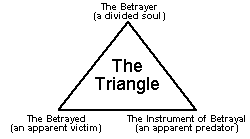 This little diagram [above] is a simplistic picture of the three points of the triangle� Some people experience only one of these points in a lifetime, and some are experienced in all three. The Betrayer is the person who apparently chooses to get involved in the triangle. I use the word "apparently" because one cannot always be sure how much conscious choice there really is, and one cannot be sure how much collusion exists between Betrayer and Betrayed as well. But whatever might be at work beneath the surface, the Betrayer is a divided soul. There is a love or attraction or need for two different things. Most of us carry the assumption that love should be exclusive, even if on a conscious level we profess a more liberal perspective. Because of the values of our Judeo-Christian heritage, we are brought up to believe that if our love is not exclusive, it is not love, and we are no longer "good" people. We have failed, or we are selfish and unfeeling. When we experience this kind of deep inner division, it is therefore extremely difficult to face. It is much easier for the Betrayer to come up with a list of justifications for why he or she is committing the act of betrayal. We do not often hear the Betrayer say, "I am divided. I am torn in half." More commonly, what we hear is: "My partner is treating me very badly. He/She is not giving me A, B, C, and D, and I need these things in order to be happy. Therefore I have a justification for looking elsewhere." At the next point of the triangle is the Betrayed, who is apparently the unwilling victim of the Betrayer�s inability to love exclusively. I have used the word "apparent" here too because, once again, there may be some question about the unconscious collusion involved in this particular role. All three points on the triangle are secretly interchangeable. They are not as different as they first appear. But the Betrayed generally believes that he or she is loyal, and it is the other person who is disloyal. It is someone else who has initiated the triangle. Usually we think of the Betrayed as having the hardest time in a triangle, because this is the person who generally acts out all the pain and jealousy and feelings of humiliation. Finally, at the third point of the triangle, there is the Instrument of Betrayal. This is the person who apparently enters an already existing relationship between two people and threatens to destroy or change it. This point of the triangle usually gets a rather bad press, being seen as "predatory" or a taker of someone else�s beloved possession. If we happen to occupy this point, we may receive only limited sympathy, and none at all from those in established relationships who feel the cold wind of their own possible future. In fact, the Instrument of Betrayal may feel himself or herself to be a victim, and may perceive the Betrayed as the predator. We can begin to glimpse the secret identity between these two points of the triangle. There are people who move round the triangle and try all three points during the course of their lives, sometimes many times [editor�s note: that would be me]. There are other people who stick with one point exclusively, and always get betrayed in their relationships, or always wind up playing the Betrayer. Or they are always the Instrument of Betrayal, and keep getting involved with people who are attached elsewhere. We might also think of triangles as belonging to four basic groups. These may overlap, but they may also be associated - up to a point - with distinctive astrological configurations. There is the ubiquitous family triangle, about which this article is primarily concerned. There are also power triangles and defensive triangles. These two varieties of triangle are not really separate, although there are some slight differences. Both have a distinctive flavor, and the reasons for their entry into one�s life may not be entirely rooted in the family background. A defensive triangle would be, for example, a man or woman who needs to form an additional relationship outside their established partnership because of feelings of deep inadequacy. They may be plagued by great insecurity, and may feel very frightened that if they commit themselves too much, and put all of their eggs in a single basket, they would be too vulnerable, and rejection would be utterly intolerable. A triangle is then unconsciously created as a defense mechanism. If they are abandoned by one partner, they have always got the other. This is not usually conscious, but it is a powerful motivating factor in many triangles. There are also triangles in pursuit of the unobtainable. These can overlap with family triangles as well as with defensive and power triangles. But there is a special ingredient to the pursuit of the unobtainable, and often the deeper motivation is artistic or spiritual. Sometimes, when we seek unobtainable love, it actually has little to do with human beings. But we may translate our creative or mystical longings into the pursuit of those we cannot have. In this way we open up a dimension of the psyche which has more to do with creative fantasy than with relationship. The artist�s "muse" is rarely his or her wife or husband. This kind of triangle can involve elements of early family dynamics, and it may also incorporate defensive motives; but it needs to be understood from a different perspective. There are exceptions, because there are always exceptions to any psychological pattern. But in the main, when a triangle enters our lives, regardless of the point we are on, there is some message in it about dimensions of ourselves which we have not recognized or lived. If a pattern of triangles keeps repeating, then it is a very strong message, and we need to listen to what it is trying to tell us. . . Divided loyalties �It is very difficult to acknowledge such a pattern in oneself. If we wind up in the role of the Instrument of Betrayal, we like to think that we have truly fallen in love with someone, and the fact that they are already in an established relationship is just bad luck. They made a mistake and married the wrong person, or they married against their will because there was a child on the way. Whatever rationalizations we give ourselves, we may justify our role as Instrument of Betrayal by devaluing the importance of the already existing bond. This may sometimes prove extremely naive, and lead to a great deal of disillusionment and hurt when one discovers that the "unwanted" spouse means far more to the beloved than one has ever been able to acknowledge. One may also discover, to one�s horror, that one begins to behave exactly like the despised rival whom one has initially relegated to the "he/she only stays with her/him because of the children" bin. When parental issues are unresolved, the urge to unseat a couple may be extremely powerful - especially if the rival is also one�s close friend, which facilitates recreating the feelings of the original family triangle. We may also see things in our beloved parent which are not so lovely. For example, a man� [may have] two very different images of mother� one of which is beloved and beautiful, the other of which is threatening or hurtful. These two attributes tend to manifest in one�s later life as two people - the Betrayed and the Instrument of Betrayal. This is what Jung called a "split anima", or the female equivalent - a "split animus". Jung was quite preoccupied with the psychological dynamics of this pattern because he suffered from it himself. Although his definitions are somewhat rigid and in need of greater flexibility in interpretation, they are useful in helping us to understand why we need triangles, and why the three points are secretly interchangeable. All three people are likely to suffer from the same unresolved parental dynamic. The inner split seems to be particularly strong and conducive to compulsive triangles when apparently irreconcilable opposites appear in the same beloved parent. There are parents in whom the opposites are not terribly opposite, but there are also parents in whom they are very extreme. Such parents are fascinating and often exercise great sexual charisma because they are so unfathomable. The parent is beautiful and beloved, but also hurtful, cruel, unfeeling, devouring, or otherwise indigestible. It is very hard for the human psyche to accept extreme opposites in one package, so one needs two people through whom one can experience the ambivalent feelings. Parental images which convey extreme opposites may contribute to a propensity for triangles in adult life. We get involved with someone, and over time that person begins to take on the image of one side of the parent. After a few years of living together, we begin to say to ourselves and our friends, "My partner�s so possessive, I just have to have some breathing space," Or we say, "My partner is so restrictive and conventional, I just have to be free to be myself," We feel we aren�t enjoying the kind of beautiful, erotic, amusing relationship that we hoped we would find in partnership. We then justify the lover who plays the role of Venus [editor�s note: venus is the planet of love and creativity]. The split is acted out, but in fact it reflects two opposite qualities that we have not come to terms with in the relationship with one parent. Of course such splits connected with the parents are, at the deepest level, concerned with opposite qualities that have not been resolved within oneself. All triangles, including those arising from the family background, are ultimately concerned with our own unlived psychic life. If we were able to reconcile our own opposites, we could allow our parents to be contradictory as well. There is nothing extraordinary about a parent having both a charming, lovable Venusian side and a withdrawn Saturnian side or a demanding Plutonian side. Human beings are multifaceted, and they may both love us and hurt us. But we may find these contradictions in our parents intolerable if the parents themselves cannot cope with their own contradictions. Then we get no help in learning to integrate our contradictions. And some of these, in astrological terms, are simply too extreme to deal with in early life. By this I mean configurations which link Venus or the Moon to Saturn or Chiron - these require a wisdom only time and experience can make available - or to the outer planets, which are quite impossible for a young child to integrate on a personal level. Triangles which involve unlived life We now come to the issue of what might really lie beneath the dynamics of triangles - beneath the parental patterns and defenses and power-plays and all the other apparently "causal" reasons why triangles enter our lives. I believe there is always an element of unlived life in every triangle, and for various reasons it seems we are sometimes unable to discover that unlived life except through the extreme emotional stress which triangles generate. Betrayal is an archetypal experience which is our chief instrument of maturation. This does not mean that we all need to become embittered cynics. But there is something important in recognizing how our fantasies of what we think life and love should be prevent us from growing up and becoming full members of the human family. Betrayal is the means through which these fantasies are punctured and recognized. We attempt to enclose ourselves and other people in our fantasy-world, which is meant to compensate for childhood pain. Since all childhoods have pain, the naive assumptions we carry are also archetypal, and reflect an alternative child-world that resembles Eden in its innocence and fusion-state with the divine parent. The serpent in the Garden is therefore an image of this archetypal role of betrayal, which is inherent in the state of innocence and sooner or later rises up to destroy our fusion. There is no formula to cope with the pain of betrayal. But an archetypal perspective can help us to look at things differently, although the pain cannot be explained or imagined away. There is no remedy for this kind of pain. But there is a difference between blind pain and pain that is accompanied by understanding. The latter has a transformative effect. When there is no consciousness, triangles do tend to repeat themselves - different characters, same script. Some triangles are truly transformative. They do break apart an old pattern, and the new relationship is genuinely much happier and more rewarding. Or the triangle serves the purpose of freeing energy, freeing inner potentials, and even if the old relationship is re-established, or one winds up with neither party, everything has changed. But we are still ourselves, however much we try to rearrange our outer lives, and if an inner issue has not been dealt with, the same patterns will begin to arise in the new relationship. The compatibility may be greater with another partner, but one must still deal with one�s own psyche. A triangle can be like a grand trine in a chart [editor�s note�that�s an astrology term having to do with three different planets aspecting each other]. The energy circles around and around; it flows back on itself and does not nourish anything else in one�s life. Within triangles, all three people tend to project elements of themselves on each other. The triangle holds these projections in place, and there may be enormous resistance to change. We might even say that the triangle forms because there is resistance to change, so whatever is seeking expression from within is experienced through projection. When such a triangle breaks up, the projections come back home again. Psychic energy is released, whether it is through death or the voluntary relinquishing of someone. The timing of this is not accidental. In one or two or even all three parties, unconscious issues have finally reached a point where they can be integrated, even if this is expressed by simply letting it go. The moment we are able to do that, the projections begin to become conscious. I do not believe real forgiving comes in any other way. It is a kind of grace. It cannot be created by an act of will. It is very sad to hear the Betrayed saying, "I forgive you," not because it is truly heartfelt, but in order to get the straying partner back again. Underneath there may be no forgiveness at all - although this may not be entirely conscious - and then the punishment can go on and on. Forgiveness can only come out of a recognition of one�s collusion in the triangle - whatever one�s role - and the taking back of one�s projections. Before that, forgiveness is not really possible. It only seems to emerge out of something being genuinely integrated in oneself. The entire process is transformative. We cannot manufacture forgiveness if we have been betrayed - nor can we manufacture it for ourselves if we are the Betrayer. We can only work to integrate what belongs to our own souls. The Saturnian parent who rejects[editor�s note- Saturn is the planet governing karmic limits], and then turns up in a triangle as a cold and rejecting partner, may have something to do with our own need to acquire boundaries. If we view this fundamental Saturnian experience from a more detached perspective, what is rejection, in the end, except someone else drawing boundaries which we find intolerable? It may be our own lack of boundaries that attracts us into a triangle where we are the Betrayed, rejected by a Saturnian partner who says, "I can�t stand this emotional claustrophobia. I want to be separate." Or we may be the Betrayer, fleeing from a partner whose emotional needs seem stifling but who secretly mirrors our own inability to cope with loneliness. The hard and painful lessons that come from these kinds of experiences are lessons about what is undeveloped in ourselves. We may have to discover our primal passions... But we may disown this at first, and say, "My mother was terribly manipulative," or, "My father was so controlling." Why do people become manipulative and controlling? If someone is expressing Plutonian qualities in a relationship, they are not doing it because it is fun; they are doing it because the relationship is equated with survival, and there is a desperate need to ensure that the beloved remains close. Pluto is mobilized when one feels under threat. People become manipulative because they are terrified of losing the object of their love. That love object constitutes survival for them, and manipulation seems the only possible way to ensure the continuity of the relationship. We are all capable of this, given the right level of attachment and the right level of threat. If we disown these Plutonian [editor�s note�Pluto is the planet governing deep psychological power�it�s negative influence has to do with the abuse of power over others]attributes and keep them firmly projected on the parent, Pluto may turn up in a triangle. Then we ourselves may have to discover how possessive we can be. Or we acquire a deeply possessive partner. We may get as far as saying, "Ah, yes, I have chosen someone just like my mother/father." That is a useful piece of insight, but it is only the beginning. This possessive quality in the parent is described by our own 4th or 10th house Pluto. We must still discover it in ourselves. Often we only discover we have a Pluto through the experience of betrayal. It is just a blank in the chart until a triangle unearths it, and then we suddenly find our Pluto for the first time. We discover that we feel passionately, that we need intensely, that desperation can make us treacherous and manipulative, and that control may seem the only way to survive. This process of self-discovery may be a frightening and humbling experience, but it allows us to fully become what we are. Psychic integration is the teleology of all triangles. Even when the outer planets are involved in parental triangles, the thing to which we are so deeply attached in the parent is really something that belongs to our own souls. This "something" may involve our stretching beyond personal boundaries and allowing a deeper or higher level of reality into our lives, but nevertheless it is connected with our own life journey. When we see astrological symbols which we experience first through the parents and then later through a triangle in which the same experience repeats itself, there is something within us that needs to be lived, and it may keep coming back through triangles until we find a way to live it. Planets which are parental significators in the chart are not only descriptive of parental patterns. They are descriptive of unlived dimensions of ourselves, especially when they do not agree with the rest of the chart. Even if the parent embodies the planet in creative ways, it is still our planet, and belongs to our own destiny. A planet in the 4th or 10th, or in major aspect to the Sun or Moon, may not be enacted obviously by the parent, but it will be part of what we experience through the parent. If the parent has not creatively lived the archetypal pattern symbolized by the planet, it is harder to understand what we are dealing with. And therefore we may not realize what we are meeting through a triangle which appears in our life later. It is not just an unfinished parental complex, although that element may be important to explore. It is ultimately one�s own planet, and therefore something of one�s own soul. It is part of our psychological inheritance, but we must give shape to it. Even triangles which appear screamingly Oedipal also have to do with our own inner lives, because what we love or hate in the parent is something that belongs to us. But we need to find our own way of living it.
time capsule from heaven - Sunday, Aug. 21, 2011
31 - Saturday, Mar. 15, 2008
Dead/Alive - Monday, Mar. 10, 2008
Do not trustTIAA-CREF-- they are fucking their customers - Friday, Jul. 28, 2006
Shilling - Tuesday, Jul. 11, 2006
Before After
|
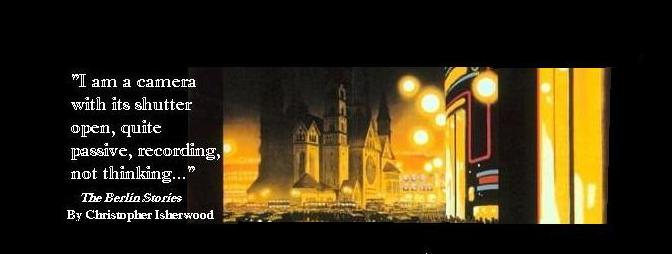

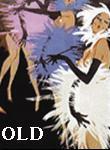



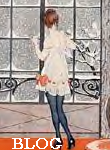

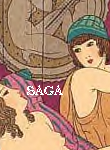

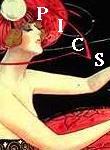


![]()














![]()
